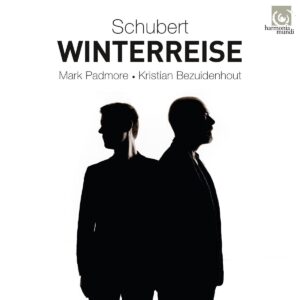It’s interesting how certain artists who’ve recorded great interpretations of Schubert’s Winterreise can’t leave well enough alone. Matthias Goerne’s Hyperion recording with pianist Graham Johnson, for example, was a crown jewel in that label’s complete Schubert lieder survey, unsurpassed, however, by respective later remakes with Alfred Brendel and Christoph Eschenbach. Similarly, Hermann Prey’s EMI Winterreise to his Philips remake. And let’s not even discuss Dietrich-Fischer Dieskau’s umpteen live and studio Winterreise encounters spanning 40-plus years. Nor is tenor Mark Padmore immune to the Winterreise remake bug.
He first recorded the song cycle with pianist Paul Lewis in 2009 for a Harmonia Mundi release that deservedly earned raves from my Classicstoday.com colleague David Vernier. He now takes on Winterreise anew, this time with fortepianist Kristian Bezuidenhout. The presence of a period piano alters dimensions of balance, dynamics, and timbre. Indeed, the honeyed beauty of Padmore’s mellifluous voice markedly differs from the fortepiano’s flinty angularity, although at times the tenor seems to scale down his sonority, possibly to accommodate his collaborator. You especially notice this in busy, energetic songs like Erstarrung, where, in the earlier recording, Padmore’s tone opens up at the climaxes, supported by Paul Lewis’ full-bodied, shapely concert-grand bass lines. By contrast, the tenor takes care not to overpower Bezuidenhout, yet without losing urgency or drama.
In other songs, Padmore has evidently sharpened details of articulation and emphasis, sometimes to the point of self-awareness, or even exaggeration. In the earlier Tauschung, for instance, Padmore’s soft singing conveys a tickling lilt and overall simplicity that is absent from the new version’s added dynamic hairpins, pointed consonants, and more noticeable breaths. Wasserflut’s interval leaps and unusual phrasings now grab your attention as vocal virtuosity, whereas Padmore’s earlier reading directed these challenges toward musical means. On the other hand, Der sturmische Morgen emerges more incisively this time around, from both participants, and the desolate Der Leiermann conveys a leaner, more fragile sound world.
Bezuidenhout’s choppy phrasing and occasionally fussy accentuations prove liabilities in slower, lyrical songs, as opposed to Lewis’ masterly legato and textural delineation; just listen to how each pianist handles Die Krahe’s introduction and you’ll get my point. Reservations aside, there is no doubting Padmore’s total immersion in the score and his intelligent deployment of a prodigious technique. However, on balance, the stronger, more artistically balanced Padmore/Lewis partnership remains my first choice.
































